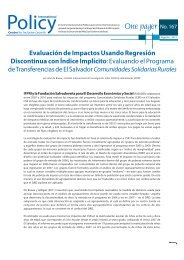Paper - International Policy Centre for Inclusive Growth
Paper - International Policy Centre for Inclusive Growth
Paper - International Policy Centre for Inclusive Growth
Create successful ePaper yourself
Turn your PDF publications into a flip-book with our unique Google optimized e-Paper software.
a few). The present exercise differs in several aspects from previous work: 1) the indices—<br />
we measure deprivation with Yitzhaki’s index, the ER polarization index, the BDP index;<br />
2) the reference groups—we assume that the comparison takes place mainly at the district<br />
level; 3) the functionings analyzed (see below <strong>for</strong> a discussion). We decide to focus on<br />
four domains of well-being of an individual, namely: i) living in a secure place with<br />
access to urban services; ii) attaining the average educational level of its age group; iii)<br />
having access to a job of minimum quality; iv) having access to the minimum standard<br />
of consumption of the city. The indices are computed separately <strong>for</strong> domain i) and<strong>for</strong>all<br />
the domains simultaneously.<br />
We use the following variables from the microdata of the Censo 2000 in order to<br />
compute individual levels of functionings failures, the qj’s and the associated population<br />
shares πj’s of the expressions in the previous section (see Table 1 in the Appendix <strong>for</strong> a<br />
detailed description of the variables used).<br />
In particular in domain i) we consider deprived an individual with the following characteristics:<br />
1. Lives in a rural area. 2. Lives in a favela. 3. Its dwelling is “improvised”.<br />
4. Its dwelling is of the one-room type. 5. Its dwelling is overcrowded. 6. Lives in a<br />
polluted area. 7. Lives in a place not served by good urban services. For domains ii) we<br />
consider deprived the following individuals : 8. Does not have (or has not had) access<br />
to <strong>for</strong>mal education; <strong>for</strong> domain iii): 9. Unemployed. or 10. Is a domestic paid worker.<br />
Finally, <strong>for</strong> domain iv) deprived is someone who: 11. Does not have access to a minimum<br />
standard of consumption.<br />
The individual functioning failure employed in the application is the number, unweighted,<br />
of the above listed variables that the interviewed claimed to have, or not to<br />
have, depending on the variable. As a clarifying example <strong>for</strong> the way we obtain functioning<br />
failures, consider the variables in the first domain. An individual living in a rural<br />
area is assigned a score of 1; if, in addition, it lives in a favela it obtains a score of 2;<br />
if, furthermore, the dwelling is “improvised” then it receives the score 3. And so on <strong>for</strong><br />
all the variables. Once we have obtained these scores <strong>for</strong> all individuals, we compute the<br />
population shares associated to the scores <strong>for</strong> each district separately. In the final step<br />
we proceede with the calculation of the indices. Keeping the analysis separate at the<br />
district’s level is driven by our assumption that the comparison takes place at this level:<br />
individuals feel that they belong to the district where they live and derive within it their<br />
standards of comparison, as previously explained. Some variables, though, are related to<br />
the entire city (education of domain ii), labour <strong>for</strong>ce status and kind of job of domain iii)<br />
consumption’s standards of domain iv)).<br />
6








